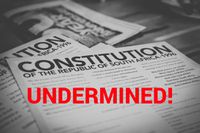
Ours is a constitutional democracy. Democracy speaks to a government of, for, and by the people. It is the administration of a community in which all citizens, rather than simply favoured individuals or organisations, have the right and opportunity to participate.
Our Constitution, The Constitution of the Republic of South Africa, is the ultimate legislation of the country. It lays forth the republic's legal foundation, as well as people's rights and duties, and the government's structure. No other legislation or government action can override the Constitution's provisions. However, certain of our government's policy views currently seem to pay lip service to the Constitution's provisions.
To point out all the inconsistencies between various government policy positions and the Constitution, and to sharpen the inconsistencies, a significantly larger amount of work would be required. Our purpose in this article is to merely point out some of the inconsistencies.
Let’s get down to the nitty-gritty.
1. Non-racialism
Racialism refers to the practice of categorising or separating people based on their race. Despite fact that our constitution clearly states non-racialism as one of its essential principles, policy stances such as Broad-based Black Economic Empowerment (BEE) are a government policy, which are in direct contrast to the concept of non-racialism as stated in our constitution.
While the purpose of a policy stance like BEE – to correct historical injustices – may be reasonable, it remains that such a policy position undermines the Rule of Law – a basic component of any well-functioning democracy – by overriding the guarantee of non-racialism in the Constitution.
There are certainly methods to right past wrongs without jeopardising our constitution's non-racialism value. Read this report – 'EED is for true empowerment, whereas BEE has failed' – from the South African Institute of Race Relations to learn how the past may be corrected without jeopardising the present and future.
2. Non-sexism
In the same way that BEE undermines the Constitution's supremacy, government policy positions such as the Women Empowerment and Gender Equality Bill of South Africa's Clause 3 (Objectives of the Bill), Clause 7 (Equal representation and participation) and Clause 9 (Measures to empower women and to eliminate discrimination) undermine the Constitution's supremacy.
Clause 9 of the bill, for example, stipulates that “despite any other law, targets on women and men in all laws and policies on empowerment shall be at least 50% women”. Such a policy position, which strives to right past wrongs but ends up restricting access to opportunities based on sex, clearly contradicts the Constitution's stated commitment to non-sexism by genderising legislation and imposing gender quotas on society.
Consider what would happen if, say, a government department was hiring, and 50% of the staff were already male, and the top candidate was a man, followed by a woman. In this case, the clause would demand that the woman be hired over the man, despite the latter qualifying more for the position on merit. Although this is only an illustration, it demonstrates how the clauses are implicated, and therefore the claim that such laws restrict access to opportunities based on sex, undermining the principle of non-sexism enshrined in our constitution.
3. Supremacy of the constitution and the rule of law
South Africa is a republic established on the value of constitutional supremacy, according to Section 1 of the Constitution. The Constitution is the “supreme law in the Republic; law or conduct inconsistent with it is invalid, and the obligations imposed by it must be fulfilled,” according to Section 2. All other legislation, common law, and tradition are thereby superseded by the provisions in the Constitution. Any rule that conflicts with the Constitution is unconstitutional. Any behaviour that is in violation of the constitution, including neglecting to fulfil a constitutional commitment, is similarly unconstitutional.
Government rules like BEE and clauses of the Women Empowerment and Gender Equality Bill referred to above undercut the supremacy of the Constitution and are, in fact, unconstitutional.
Cover image adapted from here.
